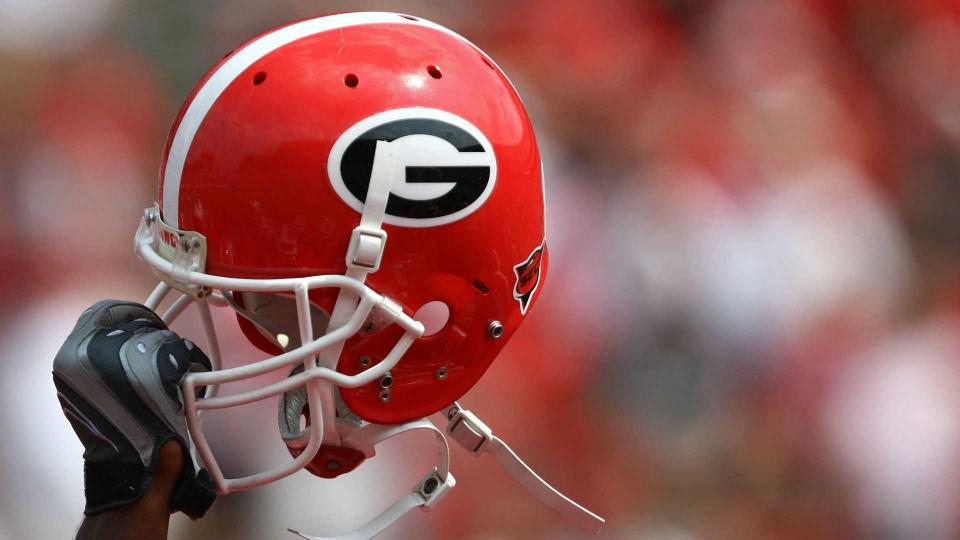Georgia has established itself as a college football powerhouse during Kirby Smart's watch.
But while the Bulldogs have found a lot of success on the field with Smart as their head coach, the program has also encountered serious problems off the field during that time.
Georgia players have faced accusations of sexual assault, domestic violence, illegal possession of firearms and more since Smart was hired in 2015, as the Atlanta Journal-Constitution reports.
But the most pervasive off-the-field issue has been reckless driving.
Georgia players reportedly have been cited for, or charged with, almost 300 driving-related offenses, with excessive speeding, street racing and driving under the influence among the accusations.
More recently, the program has been dealing with the fallout of a January car crash that killed player Devin Willock and staffer Chandler LeCroy just days after the Bulldogs routed TCU to win their second consecutive College Football Playoff national championship. LeCroy and star defensive lineman Jalen Carter allegedly were racing before the fatal crash occurred.
MORE: Why Jalen Carter faced charges related to crash that killed teammate, staffer
Here's what to know about the traffic violations that have been reported since Smart's tenure began:
Georgia traffic violations, explained
The Atlanta Journal-Constitution reports that reckless driving has been rampant during Smart's tenure with the Bulldogs, with almost 300 reported instances. The violations range from reckless driving and driving under the influence to not wearing a seatbelt.
Additionally, ESPN reported that the problem has not gone away in the wake of Devin Willock's death in mid-January: it said there have been "at least 10 reports of traffic-related moving violations" since then. The article did not contain specific details of the violations.
The Journal-Constitution's article provided specific examples of reckless driving during Smart's tenure. Some of the most notable ones in addition to the crash that killed Willock and LeCroy:
- Three players exceeding 100 mph while driving — one in a 35 mph zone.
- Kenny McIntosh cited or charged with three separate traffic offenses in a six-month period.
- James Cook being arrested for "having an open container of Hennessy cognac in his car and for driving without a valid license" and later driving after smoking marijuana.
- Kelee Ringo being warned and ticketed for driving over 90 mph twice in a span of six days
The Journal-Constitution's data was more extensive than ESPN's, as ESPN acknowledged. The AJC included minor, nonmoving violations, such as seatbelt noncompliance and accrued parking tickets, and arrests outside Athens County. Still, taken together, the reports show that Georgia's football team has a major issue when it comes to staying safe on the road.
What Georgia, Kirby Smart have said about traffic violations
Unsurprisingly, Georgia has been defensive about the revelations of the football program's citations.
The UGA Athletic Association said in a statement to ESPN that it condemned the actions and denied reporting by the Journal-Constitution and ESPN that it tolerated them.
"The Athletic Association recognizes the severity of reckless driving and is actively addressing recent incidents with educational measures, mentorship, and when necessary, punitive action. Baseless reports that suggest we tolerate this behavior are categorically false," they said. "Our coaches and administrators are deeply disappointed by the persistence of reckless driving and other misbehavior."
ESPN reported that Georgia instituted a program to "promote a culture of responsibility" that included vehicle and traffic safety. The university, though, said that it could only go so far in efforts to prevent reckless driving by players.
MORE: What did Stetson Bennett do? Revisiting why Georgia QB was arrested in offseason
"Our players have been receptive — they listen, ask the right questions, and demonstrate a clear understanding of the issue," the association said in the statement. "But, as is often the case with educating younger individuals, we recognize these efforts will need to be consistent and continuous in order to fully reinforce the message and eliminate this behavior completely.
"Despite our best efforts, we cannot completely prevent speeding and reckless driving."
It is noteworthy that Georgia's athletic association defers to the best practices of Power 5 conferences when it comes to suspending players for violating traffic safety laws.
"We historically do not suspend players for minor traffic infractions or speeding tickets," the association said in the statement, "but we do pursue appropriate action."
It is not clear what actions have been taken. Smart has played it close to the vest when discussing discipline.
“Everybody wants to know what the punishment is,” Smart said after a recent string of arrests. “Well, the players know what the punishment is.”
Perhaps the Bulldogs will begin to rethink that approach if the violations continue and, at some point, affect the program's efforts to build an on-field dynasty.


